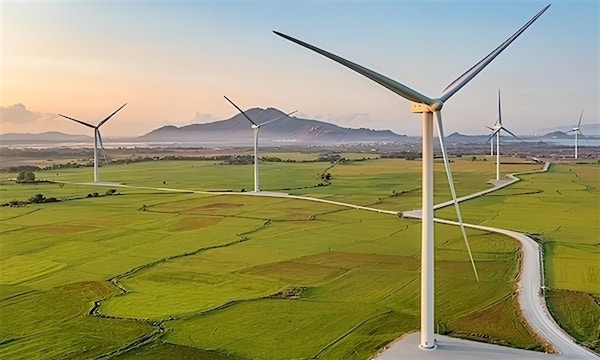Water scarcity is a pressing global challenge, casting its shadow across continents and impacting countless lives. From the arid landscapes of Cape Town to the sun-soaked regions of southern Europe, severe water stress and droughts serve as a stark reminder of the precarious balance we face.
Alarming projections indicate a staggering 55% surge in world water demand by 2050, an increase propelled by unsustainable practices in both industrial and domestic water management. The urgency of addressing this crisis was palpable during the World Economic Forum 2024 in Davos, Switzerland, where global leaders discussed the necessity of scaling proven water solutions, recognizing water's integral role in sustainable development goals.
HCLTech Chairperson, Roshni Nadar Malhotra, stressed the significance of innovative responses to this critical issue. She said, “It’s really how we respond that is extremely critical at the moment and I think in this journey, each country, each neighborhood, each village in every society all over the world is in a different lifecycle in their relationship to water. And I think this is where innovation plays a very large role.”
Water management
Indeed, the significance of efficient water management has never been more apparent than in today's landscape of climate change and population growth. A report by the World Wildlife Fund for Nature (WWF) underscores this, revealing the staggering economic value of water, totaling around $58 trillion — a sum equivalent to the combined GDPs of powerhouse nations like the US, China, Japan, Germany and India.
This statistic highlights the pivotal role of the societal, economic and environmental importance of water, thrusting water technologies into the spotlight of the clean tech domain. The HCL Group, in a bold move towards freshwater sector innovation, has partnered with UpLink, the World Economic Forum's open innovation platform, setting a precedent for transformative change towards a sustainable, water-resilient future.
The organization committed $15 million in total to drive freshwater sector innovation for five years until 2027. In under a year, its commitment saw a 10x return on investment as the first cohort of Aquapreneurs collectively raised $54.5 million after joining the UpLink Innovation Ecosystem.
At the crossroads of these amazing efforts are technology and sustainability drivers. One such technology driver that emerges as a potent tool poised to revolutionize our approach to water resource management is water analytics.
Leveraging cutting-edge technologies such as data analytics, AI and sensor networks, water analytics empowers organizations to gather, process and interpret data pertaining to water usage and distribution. The aim is to glean actionable insights that inform decision-making, optimize resource allocation and elevate overall water efficiency, ushering in a new era of water management.
AI-powered water analytics
Bharani Iyer, Vice President of Diversified Industries at HCLTech, highlights the significance of AI-powered water analytics in modern water management, complemented by a suite of cutting-edge technologies.
He said, "AI-powered water analytics stands as a cornerstone of modern water management. It is complemented by a suite of other cutting-edge water technologies. From IoT-enabled sensors to predictive modeling algorithms, these technologies play a pivotal role in scaling solutions to address pressing water management challenges, ensuring a resilient and sustainable future for communities worldwide."
One of the key aspects of water analytics is its ability to provide real-time monitoring of water systems. Through sensor networks and data collection devices, water utilities can gather continuous, up-to-the-minute information on water quality, consumption patterns and infrastructure performance. This real-time data empowers water managers to identify issues promptly, respond to emergencies and optimize system performance.
Moreover, water analytics leverages predictive modeling and ML algorithms to forecast future water demand and potential system failures. This proactive approach allows for strategic planning, reducing the risk of water shortages and enabling utilities to allocate resources efficiently.
For instance, an Australian government organization overseeing retail water supply and wastewater services in southeast Queensland embarked on a mission to enhance operational efficiency and elevate customer experience. Collaborating with HCLTech, they deployed a cloud-based, AI-driven Intelligent Data Platform (IDP) to unlock real-time insights and drive data-driven decisions.
Leveraging Azure Databricks and HCLTech's Sketch framework, the solution streamlined processes and automated operations. The outcome? A modernized infrastructure empowering informed decision-making, enhancing consumer satisfaction and yielding substantial cost savings.
"By seamlessly integrating this innovative solution, our client achieved significant enhancements in proactive decision-making, resource allocation optimization and operational resilience, setting a benchmark for sustainable water management practices across the region," said Iyer.
Water analytics also addresses longstanding challenges in water management that includes minimizing water wastage, optimizing energy consumption in water treatment processes and enhancing the resilience of water infrastructure to climate-related events. The ability to analyze vast amounts of data enables water managers to develop holistic and data-driven strategies for overcoming these challenges.
A sustainable water future
As we navigate an era of growing water scarcity and environmental consciousness, the role of water analytics becomes increasingly critical. The insights derived from data analytics and AI not only optimize current water management practices, but also lay the foundation for more sustainable and resilient water systems.
Water analytics has brought about a paradigm shift in how we approach and manage our most precious resource. By harnessing the power of data, AI and advanced technologies, water analytics is reshaping the future of water management, offering a beacon of hope for a more sustainable and water-secure world. As we embrace this transformative tool, we move a step closer to ensuring that every drop counts in building a resilient and water-conscious future.

 Listen to article
Listen to article



